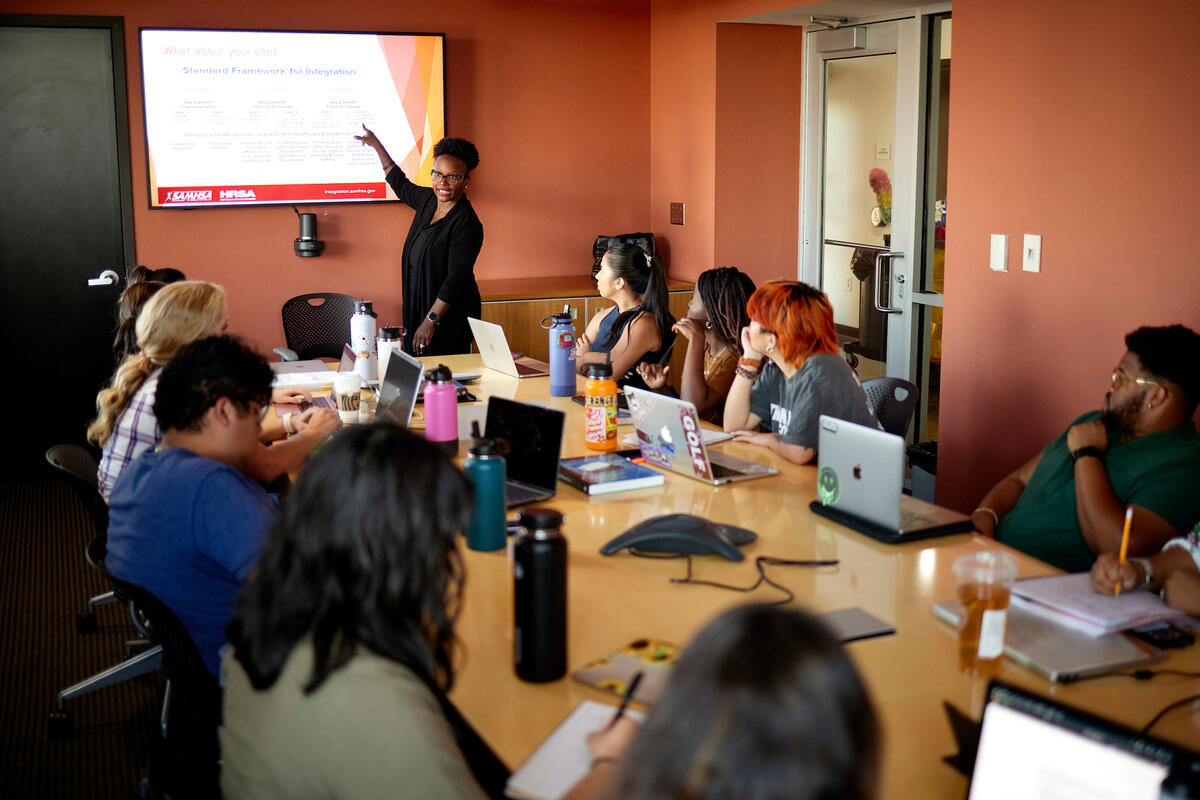Pregnant with her second child, working, teaching, and caring for her mother, who was undergoing cancer treatments, Natasha Mosby found herself finally following her own advice: Ask for help.
“I can’t cook,” Mosby laughed, as she recalled her breakthrough moment. “So I asked my mom, would it be OK if (my husband) made her meals?”
Mosby is a licensed clinical social worker, lecturer, and project coordinator in the UNLV School of Social Work. Knowing that it was important for her mother, Bobbie C. Summers, to keep her sense of independence, Mosby made sure that she asked for her permission first. Summers prided herself on her autonomy, so maintaining a sense of self and decision-making abilities was essential.
Summers eventually agreed and, along with her son-in-law, the two made meals together. Although her mother passed away 12 years ago, Mosby says the lessons that she learned in taking care of her have carried over to how she instructs students in the social work graduate program.

Her classes that focus on an integrated behavioral approach. Students learn how to help their clients understand how their physical and emotional well-being is connected. In addition, students learn cultural competency and why family dynamics differ depending on socioeconomic status, cultural background, and generational traditions.
As a clinical social worker, Mosby has counseled family members on both sides of the spectrum: the caretakers and their aging parents. Both groups want to understand how to navigate their reversal of roles as they progress into this new chapter of their lives.
Seeing parents age, become sick, slow down, or require help can be hard on its own, Mosby said. But the caregiver may also be in what is called the Sandwich Generation, which is when adults typically in their 40s and 50s have a parent who is 65 years old or older and also are either raising a young child or financially supporting a grown child who is 18 years old or older.
“Watching my mom go from this super active, Superwoman role — that was hard for me, because I thought she’d never get sick. I thought she’d forever be this giant in my eyes,” Mosby said. “I had to be OK with being scared. I was scared. Clients are afraid of their aging and their mortality. You’re watching this person change, and maybe coping with whether this will be your experience.”
Mosby offered tips for caregivers on ways to manage stress and why therapy can help manage emotions so that families can maintain mutual respect and strengthen bonds.
For the purpose of this article, the term “caregiver” will be applied to a child caring for a parent; however, the responsibilities of a caregiver are far-ranging, and the individual in the caretaker role can be caring for a grandparent, partner, or child.
Acknowledge Parents Are Changing Too
Mosby said caregivers should try to “be mindful of loved ones' autonomy."
If it is safe to do so, give them space, she said.
“Respect that. Keep in mind, too, that they are also processing and trying to make sense of what is going on with their bodies, especially if our loved ones are sick. They need time to process and center and come back to themselves,” Mosby explained.
Ask for Help
First, learn how to be comfortable with asking for help. When you get in a comfort zone, you’ll be more inclined to seek out help and network with individuals who may be going through the same things. Caregivers are in advocacy roles, having to navigate complicated medical, nonprofit, government, and healthcare systems.
Creating a support system is a way for you to advocate for yourself before you advocate for others.
“We live in a world where we have to learn how to take off our capes and say: 'It’s okay, I can’t do this all by myself, and it's okay,'” Mosby said. “It's okay for me to sit down and eat, take a moment and a breather, and process where I am. It’s okay to call friends and say, 'I am struggling'."
How are you, really?
Mosby checks in with her clients and reminds them to check in with themselves.
“Where are you today? How are you? Have you had water, eaten?” She asks. "You have to refuel yourself so you have the energy to help others. Being able to take care of yourself first — and it can be as simple as sitting outside for five minutes, touching in with our senses, watching something that brings us joy, eating gelato, doing games."
Talk It Out
“Therapy is a form of self-care,” Mosby said. “We’re having a better understanding of how things affect our mental health and not just mental but physical health, as well.”
Physical ailments such as headaches, heart pains, or stomach problems can be tied to stress. Talk therapy is known to help reduce anxiety and provide healthy coping mechanisms and introduce more effective communication skills.
Having close relationships certainly impacts overall well-being; however, Mosby advises having a neutral person to talk to if possible.
"It’s extremely critical," she explained, "To have a safe space where you can go to talk out loud about the thoughts you’re having and make sense of it all in a non-biased and non-judgmental environment."



